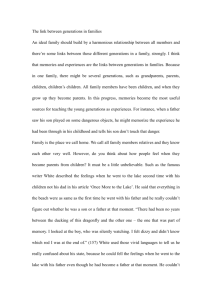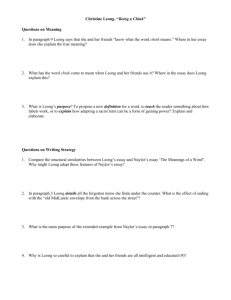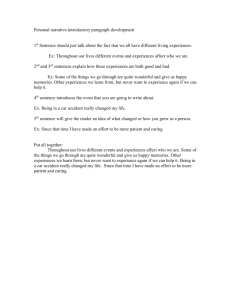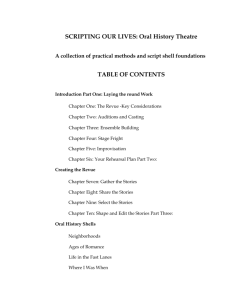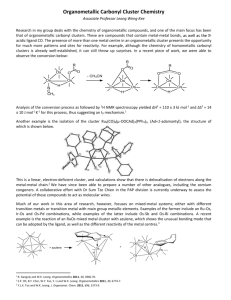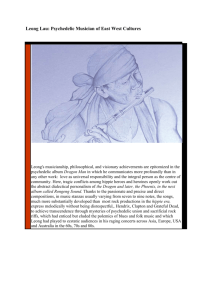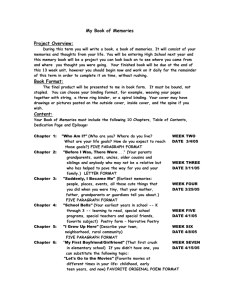Paper 2 (Power of Father
advertisement
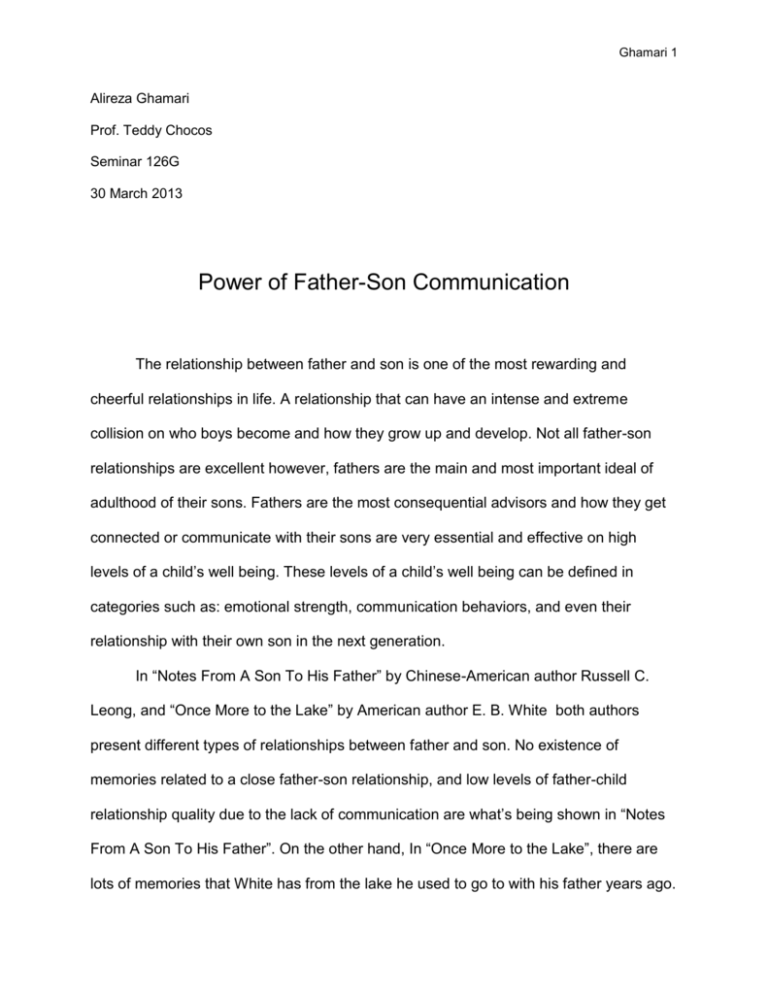
Ghamari 1 Alireza Ghamari Prof. Teddy Chocos Seminar 126G 30 March 2013 Power of Father-Son Communication The relationship between father and son is one of the most rewarding and cheerful relationships in life. A relationship that can have an intense and extreme collision on who boys become and how they grow up and develop. Not all father-son relationships are excellent however, fathers are the main and most important ideal of adulthood of their sons. Fathers are the most consequential advisors and how they get connected or communicate with their sons are very essential and effective on high levels of a child’s well being. These levels of a child’s well being can be defined in categories such as: emotional strength, communication behaviors, and even their relationship with their own son in the next generation. In “Notes From A Son To His Father” by Chinese-American author Russell C. Leong, and “Once More to the Lake” by American author E. B. White both authors present different types of relationships between father and son. No existence of memories related to a close father-son relationship, and low levels of father-child relationship quality due to the lack of communication are what’s being shown in “Notes From A Son To His Father”. On the other hand, In “Once More to the Lake”, there are lots of memories that White has from the lake he used to go to with his father years ago. Ghamari 2 Having such great memories came from the high levels of father-child relationship quality which was because of lots of communication and the way White and his father used to spend worthwhile time with each other. Therefore, Leong and White show that effective communication is key to a successful father-son relationship. Poor communication or lack thereof, with children can have negative effects on children’s passionate behaviors and communication with their own sons and daughters later on in life. Such precedent is exemplified in “Notes From A Son To His Father”. Leong, who is a son and a father, asserts that there is virtually no relationship between father and son. He does not believe that the type of bond that can be formed or lessons that can be learned from a father to a son are very unique or even valuable. “There is nothing good about being a son. I know; I am a son... allowing people to think that you are a father and son. As if any relation existed between those two terms. When there is really nothing to say”(Leong,1). It takes a lot of emotional damage or dreadful memories to contemplate such a treasured meaning of being a father or a son in a way, that all that comes from it, is a valueless and futile definition. Leong is confused about the way he needs to act and get connected with his own son. What he has seen and felt from his father and the way their relationship was, has made him clueless on building his relationship with his own son. Such confusion and poor way of defining this priceless relationship of being a father and a son stems from unappreciated memories. “My father’s hands were always busy preparing food and papers... Yet I do not know the real strength of my father’s arm. I have never been lifted on his hand, brought up to see any life outside of my own. As a child I dreamed of my father”(Leong, 2). These are memories that do not include any remembrance of a close Ghamari 3 relationship and a solid and compassionate communication with his father, which sets out low levels of father-child relationship quality that Leong and his father had. This Lack of communication leads to low-level father-child relationship quality, which demonstrates that communication is key to the child’s well-being among next generations and how they communicate with their own sons. Spending quality and memorable time with children and communicating and connecting with them in a right way to express love and the meaning of caring is what high levels of father-child relationship quality are. “Once More to the Lake” by White, is a great example to examine this idea. When White was young, he used to go to a camp on a lake in Main with his father every summer. This camp was a place that White has a lot of memories of spending times with his father which has came back to him by going there with his own son. “It is strange how much you can remember about places like that once you allow your mind to return into the grooves that lead back”(White,1). Even though White did not talk about his father a lot, he can still communicate with him by going back to the camp. This is because everything that he sees is the same as years ago when he was with his father and they remind him of the times they used to spent with each other. As White takes his own son to the lake, he is acknowledging and feeling the love that his father had for him. This is because White and his father spent memorable times together and had a successful relationship. Therefore, he can reflect the extraordinary memories with his father on his own son and communicate with him successfully. “But when I got back there, with my boy, and we settled into a camp near a farmhouse and into the summertime I had known, I could tell that it was going to be pretty much the as Ghamari 4 it been before”(White,2). White is understanding what his father was doing by spending all these times with him every summer which was building a valuable relationship. This represents the high levels of father-child relationship quality they had based on the a lot of communication and memorable time they spent with each other. According to “The Effects of Involved Nonresidential Fathers' Distress, Parenting Behaviors, Inter-Parental Conflict, and the Quality of Father-Child Relationships on Children's Well-Being” by Harper, Scott E. communication is a main factor to the child’s well-being. “Higher levels of father-child relationship quality were related to higher levels of child well-being”(Scott E, 1). Being able to apply such healthy relationship and strong communication on the next generation comes from the unforgettable and valuable memories and experiences one has from his father. This indicates the high levels of father-child relationship quality within father and son. However, low levels of a fatherchild relationship quality comes from poor communication or lack thereof which can transcend to the next generation due to not having the ability to apply such healthy and valuable communication. This disability that one can have is in consequence of not seeing and experiencing a worthwhile past relationship with one’s own father. In spite of the fact that, Leong and White both characterize their memories of their father, Leong did not have valuable and unforgettable experiences or relationship with his father like White did. Due to those hurtful experiences which lacked communication and unsuccessful relationship, Leong became confused on how to communicate with his son and demonstrate his love to him. On the other hand, White acknowledged what his father has done for him by spending all those times with him, which is the father love to his son. Therefore, White is trying to reflect that to his own Ghamari 5 son by doing similar things and spending time with him to elicit a successful relationship. As it has been shown in both author’s stories, it is easy to realize that communication and the type of relationship between father and son are very effective in a child’s life. They are effective in child’s emotional strength and communication behaviors with their own children in the next generation. What builds up and develops one’s strength to communicate and have a successful connection with his child, proceed from the past experiences and memories with one’s own father. How they get used and applied in the future depends on the type of the relationship. If the relationship includes a lot communication, then it represents the high levels of father-child relationship quality which demonstrates the child’s well-being through next generations and how they communicate with their own son. If the relationship includes poor communication or lack thereof, then it represents the low levels of father-child relationship quality which illustrates the child’s confusion and disability to communicate and build up successful relationship with his own son. Bibliography Ghamari 6 Leong, Russel C. “Once More to the Lake”. 1993. Print. White, E. B. “Once More to the Lake”. 1941. Print. Scott E, Harper. “The Effects of Involved Nonresidential Fathers' Distress, Parenting Behaviors, Inter-Parental Conflict, and the Quality of Father-Child Relationships on Children's Well-Being”. 2006. Web.
